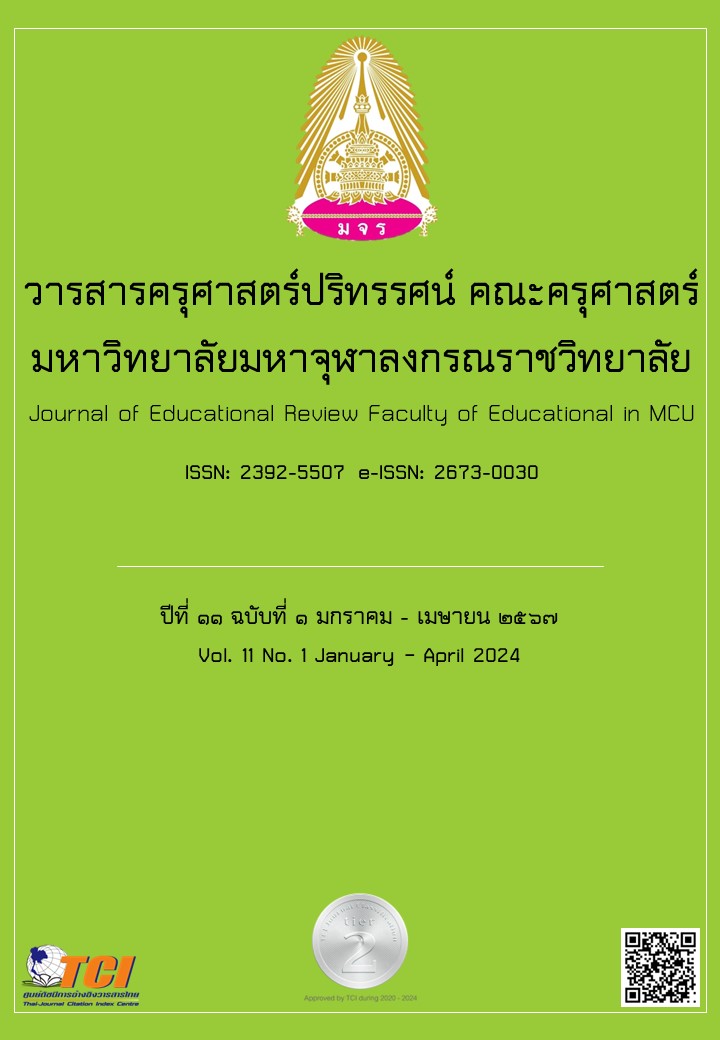แนวทางพัฒนาการบริหารวิชาการของวิทยาลัยในสังกัดอาชีวศึกษาจังหวัดสุพรรณบุรี ตามแนวคิดทักษะการทำงาน
Main Article Content
บทคัดย่อ
บทความวิจัยนี้มีวัตถุประสงค์เพื่อ 1) ศึกษาสภาพปัจจุบันและสภาพที่พึงประสงค์ของการพัฒนาการบริหารวิชาการของวิทยาลัยในสังกัดอาชีวศึกษาจังหวัดสุพรรณบุรี ตามแนวคิดทักษะการทำงาน 2) ศึกษาความต้องการจำเป็นของการพัฒนาการบริหารวิชาการของวิทยาลัยในสังกัดอาชีวศึกษาจังหวัดสุพรรณบุรี ตามแนวคิดทักษะการทำงาน เป็นการวิจัยเชิงบรรยาย ประชากรที่ใช้ในการวิจัย วิทยาลัยในสังกัดอาชีวศึกษาจังหวัดสุพรรณบุรี จำนวน 6 วิทยาลัย โดยผู้ให้ข้อมูล คือ ผู้อำนวยการสถานศึกษา รองผู้อำนวยการสถานศึกษา และครูผู้สอน จำนวน 205 คน เครื่องมือที่ใช้ในการวิจัย คือ แบบสอบถามแนวทางพัฒนาการบริหารวิชาการของวิทยาลัยในสังกัดอาชีวศึกษาจังหวัดสุพรรณบุรี ตามแนวคิดทักษะการทำงาน สถิติที่ใช้ในการวิเคราะห์ข้อมูล คือ ความถี่ ร้อยละ ค่าเฉลี่ย ส่วนเบี่ยงเบนมาตรฐาน และการวิเคราะห์ค่าดัชนีความต้องการจำเป็น (PNIModified) ผลการวิจัยพบว่า ความต้องการจำเป็นในการพัฒนาการบริหารวิชาการวิทยาลัยในสังกัดอาชีวศึกษาจังหวัดสุพรรณบุรี ตามแนวคิดทักษะการทำงาน ในภาพรวม คือ 0.398 (PNIModified = 0.398) เมื่อวิเคราะห์ความต้องการจำเป็นรายด้าน พบว่า ด้านการพัฒนาหลักสูตรมีความต้องการจำเป็นสูงที่สุด (PNIModified = 0.412) ด้านการวัดผลและประเมินผล (PNIModified = 0.394) มีความต้องการจำเป็นสูงสุดเป็นลำดับที่สองและด้านการจัดการเรียนการสอนมีค่าความต้องการจำเป็นน้อยที่สุด (PNIModified = 0.389) เมื่อพิจารณาตามทักษะการทำงานรายข้อย่อยที่มีความต้องการจำเป็นสูงสุดจากทั้ง 3 ด้าน ในการบริหารวิชาการ คือ ทักษะในสถานที่ทำงาน
Article Details

อนุญาตภายใต้เงื่อนไข Creative Commons Attribution-NonCommercial-NoDerivatives 4.0 International License.
ทัศนะและความคิดเห็นที่ปรากฏในบทความในวารสารฉบับนี้ถือเป็นความรับผิดชอบของผู้เขียนบทความนั้นเพียงผู้เดียว และไม่ถือเป็นทัศนะและความรับผิดชอบของกองบรรณาธิการ
กองบรรณาธิการขอสงวนสิทธิ์ในการคัดเลือกบทความลงตีพิมพ์และจะแจ้งให้เจ้าของบทความทราบหลังจากผู้ประเมินบทความตรวจอ่านบทความแล้ว
ต้นฉบับที่ได้รับการตีพิมพ์ในวารสารครุศาสตร์ปริทรรศน์ คณะครุศาสตร์ มหาวิทยาลัยมหาจุฬาลงกรณราชวิทยาลัย ถือเป็นกรรมสิทธิ์ของคณะครุศาสตร์ มหาวิทยาลัยมหาจุฬาลงกรณราชวิทยาลัย ห้ามนำข้อความทั้งหมดหรือบางส่วนไปพิมพ์ซ้ำ เว้นเสียแต่ว่าจะได้รับอนุญาตจากมหาวิทยาลัยฯ เป็นลายลักษณ์อักษร
เอกสารอ้างอิง
ชูชาติ พ่วงสมจิตร. (2560). การประเมินและปรับปรุงหลักสูตรศึกษาศาสตรมหาบัณฑิต แขนงวิชาบริหารการศึกษา มหาวิทยาลัยสุโขทัยธรรมาธิราช. Veridian E-Journal. 10(2). 1234-1251.
ทิศนา แขมมณี. (2555). ศาสตร์การสอน : องค์ความรู้เพื่อการจัดกระบวนการเรียนรู้ที่มีประสิทธิภาพ. กรุงเทพมหานคร: จุฬาลงกรณ์มหาวิทยาลัย.
พิมพันธ์ เดชะคุปต์ และพเยาว์ ยินดีสุข. (2558). การจัดการเรียนรู้ในศตวรรษที่ 21. พิมพ์ครั้งที่ 2. กรุงเทพมหานคร: โรงพิมพ์แห่งจุฬาลงกรณ์มหาวิทยาลัย.
เรวดี นามทองดี. (2558). การอาชีวศึกษากับการพัฒนาศักยภาพแรงงานไทยในการเป็น ประชาคมอาเซียน. Veridian E-Journal, Silpakorn University. 8(2). 669-679.
วารีรัตน์ แก้วอุไร. (2564). การพัฒนาหลักสูตร: จากทฤษฎีสู่การปฏิบัติ. พิษณุโลก: สำนักพิมพ์มหาวิทยาลัยนเรศวร.
ศิริชัย กาญจนวาสี. (2556). ทฤษฎีการทดสอบแบบมาตรฐานเดิม. กรุงเทพมหานคร: จุฬาลงกรณ์มหาวิทยาลัย.
สุคนธ์ สินธพานนท์. (2558). การจัดการเรียนรู้ของครูยุคใหม่เพื่อพัฒนาทักษะผู้เรียน. กรุงเทพมหานคร: 9119 เทคนิคพริ้นติ้ง.
อาชีวศึกษาจังหวัดสุพรรณบุรี. (2565). แผนปฏิบัติการประจำปี งบประมาณ พ.ศ. 2565. จังหวัดสุพรรณบุรี: อาชีวศึกษาจังหวัดสุพรรณบุรี.
Andrade, H. G. (1998). Project zero rubrics and self-assessment. From http://pz.harvard.edu/rubrics.php Retrieved June 14, 2023.
Burack, F. (2002). Enhanced assessment in instrumental programs. Music Educators Journal. 88(27). 6-12.
College, Career Readiness & Success Center. (2016). Integrating employability skills with classroom instruction to support English learners. Washington: American Institutes.
Davies, A., Fidler, D. & Gorbis, M. (2011). Future work skills 2020. Palo Alto: Institute for the Future for University of Phoenix Research Institute.
Lively, F. J. (2007). A collaborative journey to better music teaching through authentic assessment and evaluation: A narrative inquiry. MR32093 M.Ed. University of Prince Edward Island (Canada).
Schreuder, D. & Coetzee, M. (2011). Careers an organisational perspective. Claremont: Juta Limited.
Thomas, S.O. (1994). Knowing Learners Y Knowing Ourselves: Teachers Perceptions of Change in theory and Practice Resulting from Inquiry into Authentic Assessment. Dissertation Abstract International. 55(5). 1188A.
Wenger, G. L. (2004). What is an authentic assessment in art? Student reflections on the Visual Arts Process Diary of New South Wales. Australia. The Pennsylvania State University, Ann Arbor. Retrieved from ProQuest Dissertations & Theses Global database.
Williams, S. (2016). Future Skills: Update and Literature Review. From http://www.iftf.org/fileadmin/user_upload/downloads/wfi/ACTF_IFTF_FutureSkills-report.pdf Retrieved May 11, 2022.
Winger, T. (2005). Geading to communicate. Education Leadership. 63(3). 61-65.


